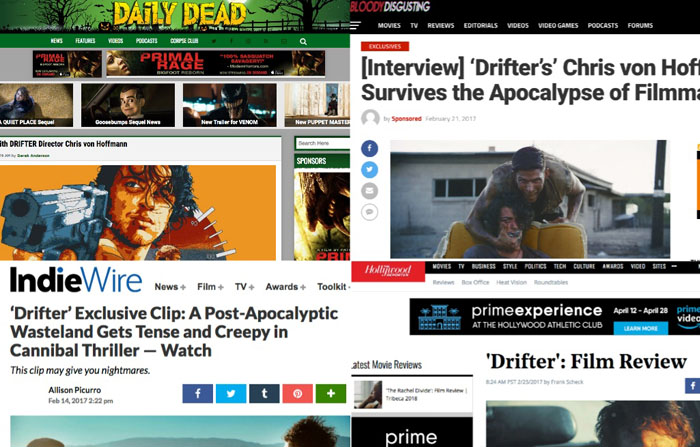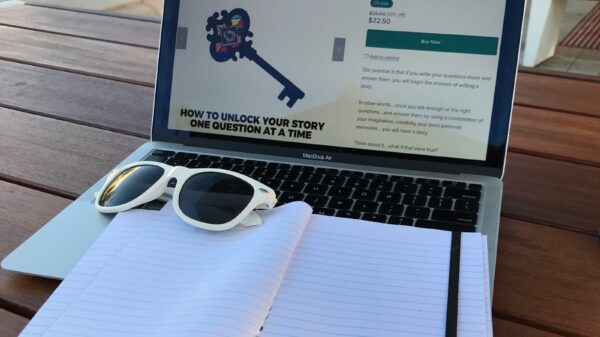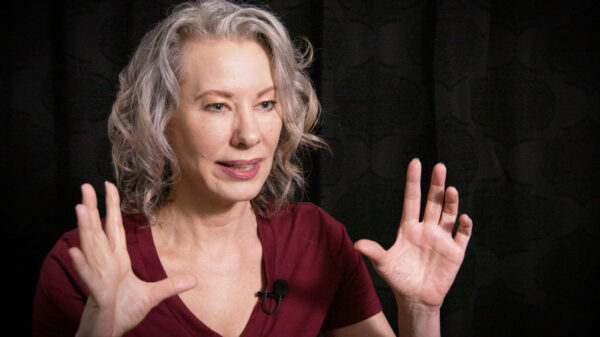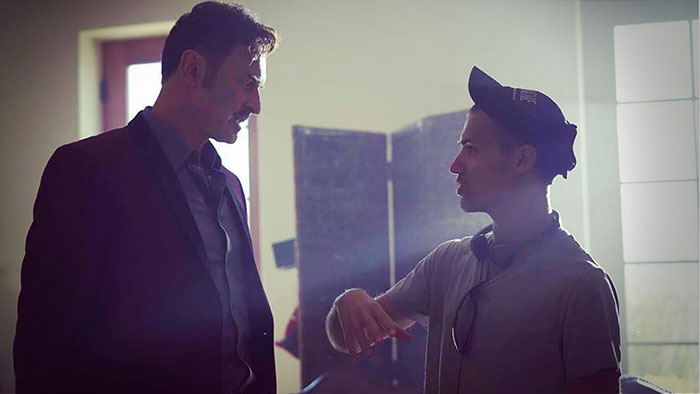
Watch the video interview on Youtube here
Film Courage: How did making your first feature film and then getting feedback on that film impact how you write things now?
Chris von Hoffmann, horror writer/director: Oh hugely, massively because with making DRIFTER, I’m going to be very, very honest I was not focusing that much on screenplay, on pedestrian narrative, on plotting, on character development. I was very much focused on a cold exercise in style. Very much making scene after scene of stuff that I love and have a thin story stitched together with duct tape, that was 100% the intention of that movie. But I think we were getting a lot of feedback when we were editing it and we knew that there were some irreparable problems that were dictated by the weakness of the screenplay and kind of shot myself in the foot a little bit by rushing into it because people were…they were just taking the movie so seriously. They were being so film school analytical about so many things because if there is a story, it’s one of those kind of movies that start off as one thing and by the end it’s a very much different thing, it keeps on transforming itself sort of like this hybrid, genre mashup which is definitely the movie I wanted to make at the time. I still think it’s a fun picture when I watch it…picture. I sound like I’m in the 40’s when I said that.
But with MONSTER PARTY, that was a really wonderful experience because there is much more pressure on that movie. I have a lot of producers involved, a lot of great people involved that have much more experience than I am. People who are extremely brutally honest from the word go, from the writing stage, to the filming of it, to the editing of it, to the sound, the music, everything. I had people watching every element of that movie. And they were all very strong collaborators, I really love working with these guys.
I think I was always wanting those heavy-hitting cut-throat producers that were going to say Chris, this is not working. You have to fix this because you are going to shoot yourself in the foot later on the editing. And I had a lot of that on MONSTER PARTY, because you get so inside the movie and you need those outside perspectives and I didn’t really have that much on DRIFTER because we were all friends and we kind of all came up together so I don’t think they were being as harsh as they should have been.
“I like morality tales. I like movies that have a moral tightrope that the characters are walking…”
With MONSTER PARTY that was not the case, but I think that was right in the long run because at the end of the day it’s the movie. It’s not your auteur personality, it’s not your cool stylist, it’s the movie. I mean at a certain point it’s not even your movie anymore, it has to be as accessible as possible and MONSTER PARTY was a great transition for me. It was almost like a new chapter in my life to really explore new territory and go back to the roots of the storytelling I was attracted to and approach it from a much more mature angle and can I have the soundtrack and the style organically climb inside the movie a little bit and not hijack the movie like DRIFTER .
I’m very proud of the experience with MONSTER PARTY, very proud of the movie.
Film Courage: Do you think most of your characters…let’s say any characters in any of your features, do they go through the hero’s journey. Because in some ways it’s different, a horror movie is not going to end in a great light where this hero has realized their potential or saved something (it’s often not the case).
Chris: With DRIFTER I was trying to do that. But MONSTER PARTY I would definitely say has a hero’s journey. But I am very attracted to stories that are populated by, I like morality tales. I like movies that have a moral tightrope that the characters are walking that the lead character might do something that you might not agree with and it might be a little bit messed up and I’m going to challenge you if you still want to go on the ride with him.
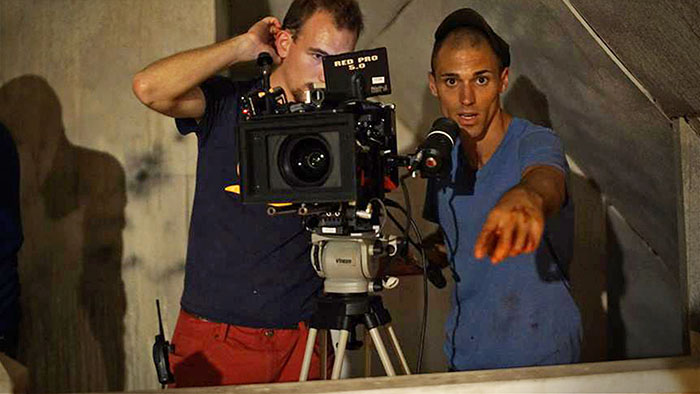
Photo courtesy of Chris von Hoffmann
A really random example that I bring up because it’s so notorious for being so bad it’s good which I think it a really genuinely fun movie is SHOWGIRLS, which I love SHOWGIRLS, it’s great. I’m not saying that ironically, I really love that movie. The first time I saw it was with my Mother, it was a very random, weird experience. But what’s really fascinating about that movie and what I’m trying to do with MONSTER PARTY, a lot was every character in that movie has kind of like has badness in them. I mean they might disguise it but they are all kind of very…they have bad, bad qualities about them, even Nomi (the main character) and the only innocent character in that movie is the girl who is the make-up artist and she gets punished for being innocent in this world of horrible people. She gets punished quite horribly and people forget about that really horrible scene in the third act with her and the rock star guy. That’s a very eye-opening, vicious scene where she gets punished for being good, a good pure person around these terrible people including the lead character.
That’s sort of what I tried to dabble in with MONSTER PARTY where its very flawed people against even more flawed people and the people you think would not be flawed were way more flawed than you possibly could imagine. But there are a couple very innocent people in the movie who get extremely punished for being very genuine.
It sounds like a sick way of looking at things, that’s always been sort of the outlook I saw the world in where sometimes good deeds go, like they always say No good deed goes unpunished or whatever. And innocent people paying the price for being what they are and bad people having this power and the moral corruption of the world in our society and our generation and I’m always trying to make some sort of bold statement about how I see, I’m not just trying to make sort of cool genre movies and violence and cool stuff. That’s all fun, but I am trying to sneak in a very bold statement about how I see the world because a lot of it is very personal. As whacked out as some of the stuff is, it is very, very personal about the kind of tone and the kind of nature of certain lead characters that we’re supposed to be rooting for.
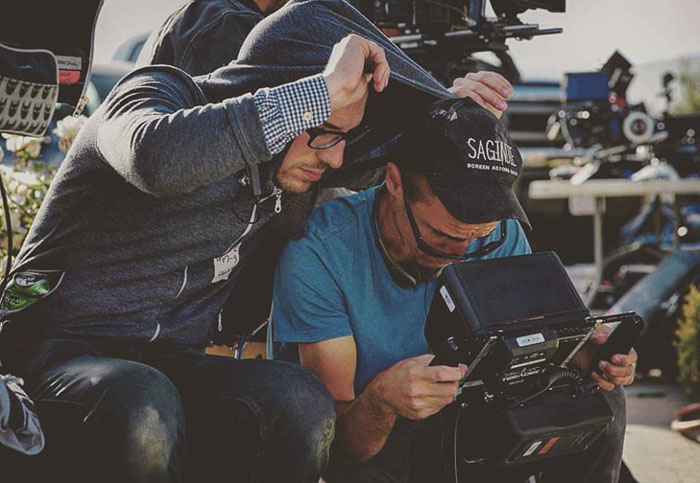
Photo courtesy of Chris von Hoffmann
I think when you’re writing stories you have put all of your good traits on screen, but you also have to put a lot of your bad traits on screen and no one wants to see just good traits. You almost embarrass yourself by putting in really bad traits about yourself. Do it in a very fun, kind of accessible way, but those kind of stories I’ve always been attracted to.
Film Courage: Or CARRIE.
Chris: Yes, CARRIE is great.
Film Courage: Being punished at home, being punished at high school.
Chris: That’s such a cynical story and then she has no other options but to terrorize her prom and then she pays the price for it. I mean that’s such a sad, great morality tale.
Because everyone has flaws and everyone has darkness inside of them, some people do a better job disguising them. But I like movies that really push the boundaries of what our protagonist are capable of and somewhat bad people against worst people. I’ve just always been attracted to that kind of storytelling.
Film Courage: Right and when you see the bad people aren’t always the stereotypical ones where if you saw them in a dark alley [you’d go the other way]. Sometimes it’s the ones whom you would think are a little more trustworthy that are really the worst.
Chris: Yes. One of my favorite directors is Larry Clark and films like BULLY and KIDS and KEN PARK, those films are very disturbing experiences but they are characters that…I grew up around people very much like those kind of people. My brother was very friends with those kind of kids. So I think a lot of that kind of stuff, hearing very revolting things that these kids would say and seeing stuff that they would do and hearing stories about them (what they would do) and I think a lot of that stuff I try to translate in a cinematic format and go back to that…It just comes from growing up and the kind of people I was around in high school and the things that I saw and just really disturbing, tragic things that were happening with people and at a certain point you just can’t quite see the world any other ways until you get into your later years. But I’m just stemming about how the world was around me growing up, the kind of people that I interacted with, and the kind that I grew up around and the people’s houses that I went to and the kind of stuff I saw and the really whacked out, dysfunctional things that were happening inside these houses and these kids.
I don’t know, I’m just very attracted to that kind of stuff and making it as grounded as possible in a cinematic kind of way.

Watch the video interview on Youtube here
CONNECT WITH CHRIS VON HOFFMANN
IMDB
Facebook
Instagram
Twitter
About Chris von Hoffmann:
After a short stint at the American Academy of Dramatic Arts and acting in several off-off-Broadway plays, Chris von Hoffmann moved to LA and turned to writing/producing/directing.
Chris von Hoffmann has made several short films including Fuel Junkie, White Trash and Vodka 7. White Trash had its World Premiere at the Chinese Theatre for the 17th Annual Dances With Films film festival and won Best Guerilla short for the 10th Annual Action on Film film festival. Vodka 7 won Best Cinematography at the WILDsound film festival in Toronto and screened at Tribeca Cinemas for the 9th Annual Big Apple film festival while Fuel Junkie had its premiere at Sony Picture Studios. In 2015 he directed his debut feature film Drifter which secured worldwide distribution and was released in 2017.
DRIFTER is now available exclusively on Netflix.
Advertisement – contains affiliate links:





